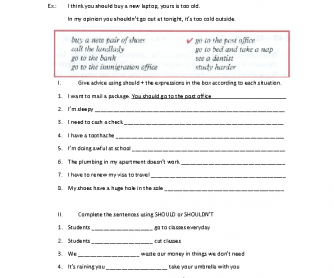
Students will have to get creative with their modal verbs to decide what they mean, and can work in pairs to write their own ideas. Give out a selection of weird and wacky signs, such as this one from the Travel Channel. To finish up the class, move onto something more fun and more challenging. They can use the given modal verbs to write sentences for each one. Remember, these should be signs that they’re familiar with already, they just need to put their meanings into English. These could be road signs, safety signs or signs you might find in the classroom. This should prompt them to give you “you must not smoke.”įrom here, you can teach a selection of modal verbs, such as “have to,” “must” and “mustn’t.”Ĭreate a worksheet or PowerPoint presentation which provides a selection of signs. Then, ask your students how they could make the sentence stronger. This should elicit “you can’t smoke,” or something to that effect.
Modal verbs exercises should and ought to full#
If they say “no smoking,” ask them to elaborate with a full sentence. Start by showing or drawing a picture of a no smoking sign to your class and asking them what it means. It uses real-life examples that students see around them every day, so they should have no problem picking up the grammar and putting it into context.
Modal verbs exercises should and ought to how to#
This exercise is great for teaching how to use modal verbs for prohibition and obligation. Here are five activities so fun that students will forget they’re even learning! 1. With these ESL activities, you can make them fun! That way, students will pick up modal verbs more easily. Grammar lessons don’t have to be boring or tedious. For example, you don’t have to come up with your own activities when FluentU has them all for you!ĥ Must-use Exercises for Teaching ESL Modal Verbs


This is why they’re absolutely essential for your students. Modal verbs are incredibly versatile and are used for several different functions in the English language. Please contact me if you have any questions or comments.Try FluentU for FREE! The Many Uses of Modal Verbs Welcome! I'm Seonaid and I hope you like the website. Need more practice? Get more Perfect English Grammar with our courses. The past modals 'could have + past participle', 'should have + past participle' and 'would have + past participle' can be confusing.

We also use modal verbs to say something is not allowed. We can use verbs such as 'can', 'could' and 'may' to ask for and give permission. We can use verbs such as 'must' or 'should' to say when something is necessary or unnecessary, or to give advice.Ĭlick here to find out more about obligation Permission My grandfather could play golf very well.Ĭlick here to find out more about ability.We use 'can' and 'could' to talk about a skill or ability. £200 for two cups of coffee!Ĭlick here to find out more about probability. It's snowing, so it must be very cold outside.We often call these 'modals of deduction' or 'speculation' or 'certainty' or 'probability'. Probability:įirst, they can be used when we want to say how sure we are that something happened / is happening / will happen. Here's a list of the modal verbs in English: canġ: They don't use an 's' for the third person singular.Ģ: They make questions by inversion ('she can go' becomes 'can she go?').ģ: They are followed directly by the infinitive of another verb (without 'to'). Click here for all the exercises about modal verbs


 0 kommentar(er)
0 kommentar(er)
